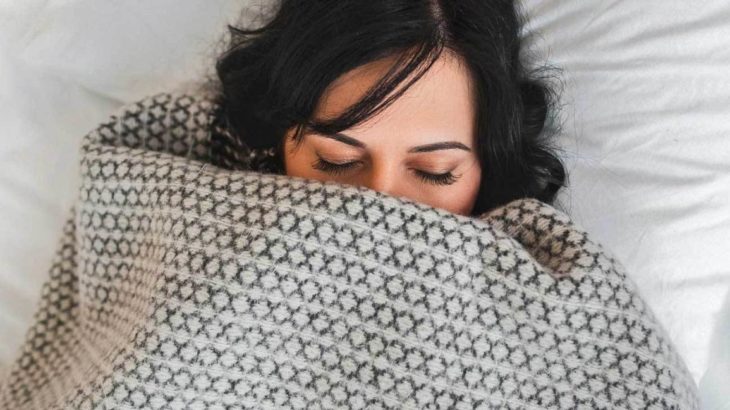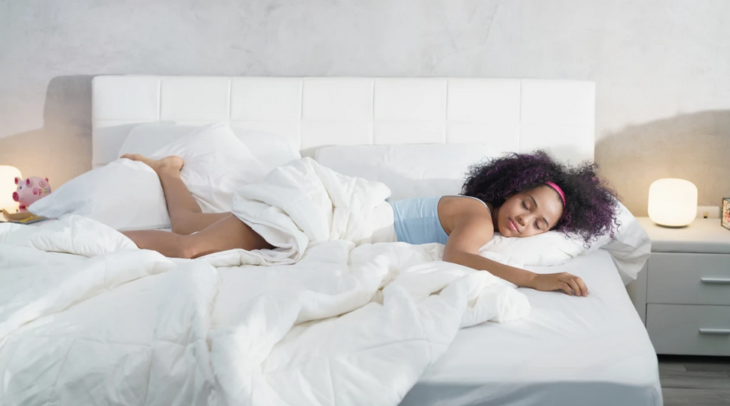This story begins in a basement waiting room in Brooklyn. My boyfriend and I stare at our phones on a dirty looking love seat across from the reception desk. There’s no service, and cellphone games give me headaches, so I pick up an issue of Parenting magazine, even though I am not a parent and — thank god — this isn’t that kind of doctor’s visit. I’m not thirsty, but I drink a lot of water from the water cooler to occupy myself. It takes almost an hour before my name is called. The nurse is friendly, but she mumbles and I keep having to ask her to repeat herself. I am relieved when she asks me how much I weigh rather than making me step on the scale, but the anxiety rises again when she measures my blood pressure. The machine squeezes my arm and then releases it in slow puffs — panic, panic, panic.
Actually, this story begins on Christmas night. And the night before. And the night after. And all of the nights that I went to bed too early. This story begins with me apologizing. This story begins with my mother’s worried face. It begins with an unquenchable, inexplicable desire for sleep, which actually begins nine years ago when I was in 12th grade and became addicted to going to bed. Because that’s what this is really about. That’s the reason I am waiting in a cold doctor’s office, picking nervously at my nail polish, listening to the paper crinkle each time I move, and wanting very badly to pee.

Source: healthline.com
I’m tired. I’m tired all the time.
I booked my appointment online on a website not unlike Yelp. Physicians, brunch spots, it’s all the same. Brooklyn twentysomethings make sense of things by scrolling through star reviews written by their peers. When making the appointment three days prior, I chose a small, middle-aged woman, described by reviewers as competent and kind, but the doctor who finally arrives is a man who looks like a less bloated Matthew Broderick and says “hokay” instead of “okay.”
When he asks me why I’m here, I don’t know where to start. Scenes of Christmas vacation flash through my mind. I slept more than I saw my family. On New Year’s Eve, I chugged Redbull and black tea during the day and still fell asleep on my boyfriend’s shoulder on the subway ride home from dinner. I was in bed by 9:30 and woke to the sound of fireworks and cheers from the bar across the street. Happy New Year. I felt like crying. I recall a particular weekend in high school when I visited a friend’s lake house and spent half the time sleeping on the living room couch while my friends swam and took the boat out. I think of cancelled plans, of wasted weekends, of naps that last all afternoon. I remember the letter I wrote to my ballet instructor when I quit dancing after 15 years because I didn’t have the energy to get out of bed.

Source: The Wool Room
But to the doctor, I simply say, “I’m tired.”
The worst part about being tired all the time is disappointing everyone. It’s not an excuse. It’s not even an explanation. It’s not good enough to just be tired in this busy city where the world revolves around one’s ability to hustle, network, show your stuff and look good on everyone’s Instagram feed while you do it. In the city that never sleeps, I am the exhausted exception. Sleeping too much is equated with laziness — a common stereotype of my slacker generation of unindustrious, entitled twentysomethings who can’t seem to get off our laptops and out of our parents’ basements. The truth is, while I spent 10 mostly wretched post-college months in my mom’s house making barely over minimum wage at a hotel in upstate New York, I now have a good job in Manhattan and a one bedroom apartment in Brooklyn where I pay all the bills and buy all the groceries and even vacuum occasionally. On paper, I’m doing just fine. Better than fine, actually, because hard work alone won’t get you where I am in a poor economy with a degree in film and English. That takes connections or luck or both, and I have to admit it: I’m very, very lucky. But here, in this doctor’s office, with my shirt hiked up around my ribs while the doctor prods at my pale stomach, I feel ashamed and embarrassed and very much like a stereotype. How much of this is self-inflicted? Have I done this to myself with alcohol and take out and unopened bottles of vitamins? Maybe I really am just a product of the laptop generation, quietly Googling “can introversion make you physically ill” while people with real problems exist. Maybe the problem is me.
We talk about my diet and my mood, my medical history. I fill out a survey about depression. It depresses me. He shines that beady little light into my eyes and ears and even makes me stick out my tongue and say “AH” like they do in the movies. Sometimes he interrupts me. He asks if I have a regular non-OB GYN, and I tell him he’s it. I haven’t been for a checkup since high school and I have no excuse. Really, he says, there’s nothing to be done until he looks at my blood. That’s the easy part because I don’t have to think anymore. The nurse taking my blood is a man who wears jeans and a sweatshirt and seems a little lost. He might be new. All of this is moderately off-putting and I don’t look when the needle goes in.

Source: healthcuretips
Three days later, I get an email from my doctor, telling me my results are back and everything looks normal. I want to tell him that is the problem, has always been the problem. Everything looks normal but nothing feels normal and I cannot reconcile the two. I start to wonder if I would even recognize normalcy if I woke up with it one morning. The older I get, the less sure I am about how other people live and eat and sleep when they are alone in their one bedroom apartments, typing their symptoms into WebMD and hitting the snooze button and staring into the yellow glare of the refrigerator. How much of what I think of as normal is really just an idea based on characters from movies, books, and TV? I am equal parts relieved and troubled to find out that my blood work is healthy. While of course I’m grateful for my health, my sleeping habit is beginning to feel even less legitimate, and more like an addiction, a fault, a choice.
What next, then? As it’s still January, with the whole year stretching out in front of me, I decide to make some resolutions. I resolve to work on my diet and exercise program, which means I will buy vegetables and lie to the guys at my gym about the extended vacation from which I’ve recently returned. I resolve to finally start taking the vitamins collecting dust on my shelves. I resolve to stop feeling guilty or lame for going to bed early when I feel like I need it, even on the weekends. I resolve to forgive myself for this, and I know it will be the hardest resolution to keep, which makes me wonder — am I tired because I exhaust myself?

Source: Savvy Sleeper
Would I have more energy if I started liking myself a little more? Would I bound out of bed in the mornings if I started to treat myself with kindness instead of listening to the voice in my head that nags, stresses, and criticizes? And how does one even begin to make that kind of change? Am I supposed to start taking yoga and writing mantras on my bathroom mirror in lipstick? For now, I will just resolve to be more patient with myself. I will practice making my mind a place I don’t need to escape. And in the morning, I will get out of bed and do it again.
Original by
